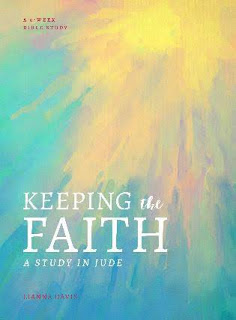As you probably already know, Jude is a very small book of the Bible. It only has 25 verses in total and to be honest, I was really wondering how the author was going to get a full 6 week study out of this tiny amount of scriptures.
The book is laid out in six weekly segments. The topics covered are as follows:
Week One: Keeping the Truth
Week Two: Keeping the Grace
Week Three: Keeping the Soul
Week Four: Keeping the Spirit
Week Five: Keeping the Body
Week Six: He is Able to Keep Us
At the beginning of each week, there is the two-page topic section that will direct your weekly study, followed by 5 daily lessons. Each of the daily lessons has a section of scripture from the book of Jude, and a cross reference scripture to go along with Jude. There is a short two-three sentence prayer followed by the teaching/study concept for the day and then several Study and Reflection questions with ample room for you to write your thoughts and findings.
In the introduction, the author states "By the end of our six weeks together, you will have a greater biblical knowledge of warnings, false teachers, Enoch, Korah, and others. You will be conversant about theological topics like Gnosticism and antinomianism." Admittedly, those two sentences were enough to turn me off from the beginning.
In the first chapter, reference is made to "The Chicago Statement on Biblical Inerrancy", including the "Articles of Affirmation and Denial" found in the Appendix. I had never heard of these before, so I needed to know what it was and where it came from to understand why it's included in this book. In my researching I found this article on Wikipedia. (Long story short, in 1978, 200 evangelical leaders met at a convention in Chicago and drafted the documents as a trans-denominational faith statement.) Trying to read the Articles of Affirmation and Denial is just painful, and honestly more confusing than it is helpful The author uses a great deal of quotes and footnoted references from other authors and their works, including the Book of Enoch, which got left out of the Bible for a reason.
Honestly, some of the references make absolutely no sense. For example reference #26 in Week 4, page 106 says "This quote is not in the Bible, but it is similar to what is written in a book called 1Enoch, or the Book of Enoch. Concerning the source of the quotation in Jude, Commentator R.C.H. Lenski writes: 'Jude quotes Enoch and not some book. How well or ill or in what manner the Book of Enoch reproduces Enoch's prophecy is a minor matter and does not affect Jude. Jude quotes directly; whether the Book of Enoch quotes directly or indirectly - what difference does it make? Jude and the Book of Enoch say about the same thing; but that lends nothing to Jude, nor does it detract from him.'" Maybe it's just me, but that says a whole lot of nothing in a lot of words, and really doesn't help me understand why the reference was used in the first place.
Personally, I think that had the author used more of her own words and Biblical knowledge, and less of everyone else's it would be more palatable and cohesive. I felt like a lot of the footnotes and references either made no sense, or negated the very points the author was trying to make. Maybe I'm one of the few people who'll follow the footnotes and it won't matter to the majority, but for me it does matter.
Honestly, another thing that made the book unappealing to me was the over use of big words and incredibly long run on sentences. It's not uncommon for a 7-8 line paragraph to only be made up of two sentences. It's as though the author feels she needs to prove how educated she is, instead of just teaching on the topic. I was not a huge fan of the writing style in general. However, since we're not all cut from the same cloth, I'm sure there are many people who will dearly love this study. It's all about finding what works for us!
About the Author:
LIANNA DAVIS is a student of the Word with a B.A. in Ministry to Women from Moody Bible Institute. She and her husband, Tyler, reside outside of Dallas, Texas. More of her writing can be found at www.liannabdavis.com.
Disclaimer: I received a free copy of this book for review purposes only. I did not receive any other form of compensation, now was I required to give a positive review. The thoughts expressed in this review are strictly my own.


No comments:
Post a Comment
Thank you for stopping by!